|
Games 1, 2, 5 and 7 are home games for
the higher seeded team in this best-of-7 series. Injuries are turned off
for the playoffs, meaning a player can be injured only for that particular
game, but can return for the next game. Pitching rotations are on a four-man
skip rotation, meaning the fourth starter will be skipped if the first starter
is ready to pitch. Since there are off days after games 2, 4, 5 and 6, some
game 1 starters will be available in game 4 on three days' rest. Benched
starters can be moved to the bullpen.
The two teams that survive this series
will go on to play the 13th annual DMBL World Series.
Arkansas Golden Falcons (#1, 100-62) vs.
Tijuana Banditos (#6, 80-83)
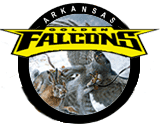
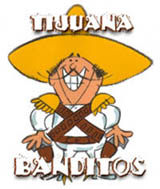 The Cinderella Story continues for the Tijuana Banditos,
who keep doing the impossible. First they climbed out of nowhere to tie,
in the final week of the season, for the final wildcard slot; then they upset
the Columbia Rattlesnakes, on the road, in the one-game playoff
to claim the No. 6 seed; then they not just beat, but actually swept, the
third-ranked Carolina Mudcats to advance to the second
round. How incredible has the Banditos' post-season been so far? They have
the worst record of any post-season contender in DMBL history; they've gone
farther into the post-season than any franchise owned by Paul Barbosa has ever climbed, after getting swept
in the first round in each previous appearance (2000 and 2002); they knocked
out the Mudcats, the first time in that franchise's history that it suffered
a first-round loss; they became just the second #6 in league history to upset
the #3, and were the first team to do so via a sweep.
The Cinderella Story continues for the Tijuana Banditos,
who keep doing the impossible. First they climbed out of nowhere to tie,
in the final week of the season, for the final wildcard slot; then they upset
the Columbia Rattlesnakes, on the road, in the one-game playoff
to claim the No. 6 seed; then they not just beat, but actually swept, the
third-ranked Carolina Mudcats to advance to the second
round. How incredible has the Banditos' post-season been so far? They have
the worst record of any post-season contender in DMBL history; they've gone
farther into the post-season than any franchise owned by Paul Barbosa has ever climbed, after getting swept
in the first round in each previous appearance (2000 and 2002); they knocked
out the Mudcats, the first time in that franchise's history that it suffered
a first-round loss; they became just the second #6 in league history to upset
the #3, and were the first team to do so via a sweep.
But unless the Banditos' Fairy Godmother
is packing an extra-large magic wand, their fairy tale season may be coming
to an abrupt end as they face off against the defending world champion Arkansas Golden Falcons. After all they've accomplished
this season, Tijuana fans have to be ecstatic about their team's performance,
even if their post-season ends in Round 2. But just for a moment... imagine
that it doesn't!
Of course, it would be the mother of all
upsets. The Golden Falcons won 9 out of 13 against the Banditos, their best
record against any playoff team. The Banditos were just 38-44 (.463) away
from Tijuana, the second-worst road record of any playoff team this season,
and four of the seven games are going to be played in Arkansas, where the
Golden Falcons have the league's second-best home record (52-29). The Golden
Falcons were equally adept at beating up the Banditos either at home or away,
going 5-2 against them at Quisenberry Memorial Park and 4-2 against them
in Tijuana's Corona Stadium. And, of course, Mike "Stump"
Matiash has won more World Series titles (five) than any other owner.
Meanwhile, the Banditos scored a fourth-best 853 runs but allowed a sixth-worst
844 runs, for a sixth-best +9 run differential, and finished near the bottom
of the pack in team defense. But as befitting a Cinderella team, they're
all about the intangibles: They were 13-7 in extra-inning games, 14-4 in
games tied after 7 innings, and had 14 come-from-behind wins when losing
after 7 innings, all league highs this year.
The Golden Falcons posted the league's
best record, largely thanks to league's second-best pitching staff (698 RA).
In fact, "second-best" may be a good motto for this squad -- a bad omen,
perhaps? -- in that they had the second-best home record (52-29), second-best
road record (48-33), second-best division record (48-30) and second-best
record against lefties (39-21)... The offense ranks just sixth in team batting
average (.277) and OPS (.780), ninth in doubles (279), tied for ninth in
home runs (193), and had the third-most strikeouts (1125). So how did they
finish fifth in runs scored (846)? Well, they were tied for first in stolen
bases (71), ranked fourth in OBP (.344), and have a guy named Barry Bonds in the middle of the lineup.
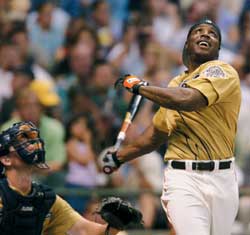 How much does Bonds mean to this offense? Without him, the team's BA falls
to .272 (7th), its SLG drops to .413 (9th) and its OBP plummets to .324 (tied
for 10th), for a 9th-best .737 OPS. The only thing standing between Bonds
and the Kevin Mitchell Award is
the incredibly high standard he set when he won the award in 2002, smashing
several DMBL records along the way. His 2004 numbers were remarkable, just
not historic: He finished first in OPS (1.155), OBP (.459), SLG (.696), runs
created (157.9), runs created per 27 outs (12.7), isolated power (.363),
AB/HR (9.8) and total average (1.373); second in secondary average (.588);
tied for second in intentional walks (15); third in walks (105); tied for
third in batting average (.333) and home runs (48); and sixth in RBIs (120).
How much does Bonds mean to this offense? Without him, the team's BA falls
to .272 (7th), its SLG drops to .413 (9th) and its OBP plummets to .324 (tied
for 10th), for a 9th-best .737 OPS. The only thing standing between Bonds
and the Kevin Mitchell Award is
the incredibly high standard he set when he won the award in 2002, smashing
several DMBL records along the way. His 2004 numbers were remarkable, just
not historic: He finished first in OPS (1.155), OBP (.459), SLG (.696), runs
created (157.9), runs created per 27 outs (12.7), isolated power (.363),
AB/HR (9.8) and total average (1.373); second in secondary average (.588);
tied for second in intentional walks (15); third in walks (105); tied for
third in batting average (.333) and home runs (48); and sixth in RBIs (120).
With Bonds able to fill only one slot in
the lineup, manager George Brett and batting coach
Brian Harper have been creative
in getting production out of the rest of the offense by running wild on the
basepaths -- in addition to tying for the league lead in stolen bases, they
also led in stolen base attempts (105), even though their .670 SB% was third-worst
success rate in the DMBL -- and by platooning like crazy. There are just
two regulars, Bonds and Lance Berkman (.267, .815
OPS, 19 HR, 64 RBI in 563 PA), with everything else a part-time job. The
catching duties are shared by Jason Phillips (vs
RHP: .234, .298 OBP, .332 SLG) and Keith Osik (vs
LHP: .415, .466 OBP, .551 SLG); first base is manned by Andres Galarraga (vs RHP: .285, .323 OBP, .351 SLG)
and Ken Harvey (vs LHP: .377, .373 OBP, .582 SLG);
second base by Orlando Hudson (vs RHP: .287, .329
OBP, .400 SLG) and Ronnie Belliard (vs LHP: .347,
.423 OBP, .559 SLG); third base by Sean Burroughs
(vs RHP: .253, .305 OBP, .367 SLG) and Wes Helms
(vs LHP: .301, .389 OBP, .602 SLG); shortstop by Julio
Lugo (vs RHP: .266, .313 OBP, .386 SLG) and Adam
Everett (vs LHP: .305, .346 OBP, .380 SLG); center field by Kenny Lofton (vs RHP: .303, .357 OBP, .467 SLG) and
Corey Patterson (vs LHP: .253,
.265 OBP, .411 SLG) and right field is a "reverse platoon" of righty Juan Gonzalez (vs RHP: .255, .289 OBP, .523 SLG) and
lefty Larry Walker (vs LHP: .299, .399 OBP, .429
SLG). Careful readers will take note that those "vs LHP" numbers are for
the most part much more impressive than the totals against righties.
All that platooning may make for a messy
lineup card -- and also a very obvious weakness that can be exploited by
a team with a deep bullpen. But it generates enough offense to carry Arkansas's
very talented pitching staff, resulting in a third-best +148 run differential.
The Falcons rank second in team ERA (3.86), strikeouts (1309), K/9 (8.0)
and shutouts (18); third in R/9 (12.2), H/9 (8.7) and QS% (.512); tied for
third in HR/9 (1.1); and fourth in BB/9 (3.1). The bullpen led the league
in saves (56) and lowest percentage of inherited runners who scored (.239);
second in lowest BS% (.233); and tied for second in holds (48). They also
led the league in winning percentage when leading or tied after seven innings
(.887).
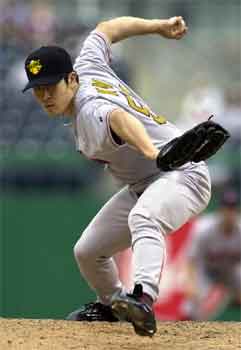 The Golden Falcons have good news and bad news when it comes to their starting
rotation. The good news is they have two Ben McDonald Award candidates to choose
from when it comes to Game 1: Pedro Martinez (14-6,
3.30 ERA, 12.2 R/9) or Curt Schilling (18-6, 3.83
ERA, 10.9 R/9). The bad news is those two can't start all seven games. They'll
need to get at least one, and possibly two, starts out of Kevin Brown (13-13,
4.72 ERA, 12.8 R/9), Roger Clemens (9-9, 4.14 ERA,
12.3 R/9) or C.C. Sabathia (19-7, 4.78 ERA, 14.0
R/9). Sabathia had the best record, but also the worst peripheral numbers;
the Banditos also are slightly better against lefties (30-29) than against
righties (50-54). If you're looking for a surprise starter, forget about
Brad Penny, who was banished to
Triple-A after three regular season starts (1-1, 12.15 ERA, 18.9 R/9); instead,
pitching coach Bret Saberhagen might be toying with
the idea of putting closer Byung-Hyun Kim into the
rotation. BK already tried it during the regular season, to mixed results
(0-3, but 3.58 ERA, 11.0 R/9, in five starts). Saberhagen can afford to use
Kim in the rotation because his bullpen is so incredibly deep, with
Octavio Dotel (6-5, 7 SV, 4.31
ERA, 12.8 R/9, 40 BB, 93 K in 87.2 IP); Brad Lidge
(6-1, 3 SV, 3.14 ERA, 12.4 R/9, 34 BB, 72 K in 71.2 IP); Damaso Marte (3-7, 3 SV, 3.81 ERA, 13.6 R/9, 23 BB,
52 K in 54.1 IP); Tom Martin (3-2, 7 SV, 3.44 ERA,
11.1 R/9, 17 BB, 27 K in 34.0 IP) and Scott Williamson
(1-1, 3 SV, 0.88 ERA, 8.2 R/9, 11 BB, 36 K in 30.2 IP) all having earned
saves this season. But if Kim is not starting games, he will be finishing
them: He led the team, and finished third in the DMBL, with 33 saves, despite
spending three weeks in the starting rotation, and sitting out the final
two weeks of the season to rest up for the post-season. Kim's 2.51 ERA was
second-lowest in the DMBL, and he also ranked third in lowest slugging percentage
(.340), fouth in lowest batting average (.234) and on-base percentage (.294),
tied for fourth in fewest home runs allowed (0.7).
The Golden Falcons have good news and bad news when it comes to their starting
rotation. The good news is they have two Ben McDonald Award candidates to choose
from when it comes to Game 1: Pedro Martinez (14-6,
3.30 ERA, 12.2 R/9) or Curt Schilling (18-6, 3.83
ERA, 10.9 R/9). The bad news is those two can't start all seven games. They'll
need to get at least one, and possibly two, starts out of Kevin Brown (13-13,
4.72 ERA, 12.8 R/9), Roger Clemens (9-9, 4.14 ERA,
12.3 R/9) or C.C. Sabathia (19-7, 4.78 ERA, 14.0
R/9). Sabathia had the best record, but also the worst peripheral numbers;
the Banditos also are slightly better against lefties (30-29) than against
righties (50-54). If you're looking for a surprise starter, forget about
Brad Penny, who was banished to
Triple-A after three regular season starts (1-1, 12.15 ERA, 18.9 R/9); instead,
pitching coach Bret Saberhagen might be toying with
the idea of putting closer Byung-Hyun Kim into the
rotation. BK already tried it during the regular season, to mixed results
(0-3, but 3.58 ERA, 11.0 R/9, in five starts). Saberhagen can afford to use
Kim in the rotation because his bullpen is so incredibly deep, with
Octavio Dotel (6-5, 7 SV, 4.31
ERA, 12.8 R/9, 40 BB, 93 K in 87.2 IP); Brad Lidge
(6-1, 3 SV, 3.14 ERA, 12.4 R/9, 34 BB, 72 K in 71.2 IP); Damaso Marte (3-7, 3 SV, 3.81 ERA, 13.6 R/9, 23 BB,
52 K in 54.1 IP); Tom Martin (3-2, 7 SV, 3.44 ERA,
11.1 R/9, 17 BB, 27 K in 34.0 IP) and Scott Williamson
(1-1, 3 SV, 0.88 ERA, 8.2 R/9, 11 BB, 36 K in 30.2 IP) all having earned
saves this season. But if Kim is not starting games, he will be finishing
them: He led the team, and finished third in the DMBL, with 33 saves, despite
spending three weeks in the starting rotation, and sitting out the final
two weeks of the season to rest up for the post-season. Kim's 2.51 ERA was
second-lowest in the DMBL, and he also ranked third in lowest slugging percentage
(.340), fouth in lowest batting average (.234) and on-base percentage (.294),
tied for fourth in fewest home runs allowed (0.7).
Will the Golden Falcons' pitching staff
be enough to shut down the Banditos' lineup? It won't be as easy as you might
think. After years of watching the Golden Falcons -- and Bonds -- demolish
opposing pitchers, it's tough to remember that Tijuana's offense actually
scored more runs than Arkansas's this season. 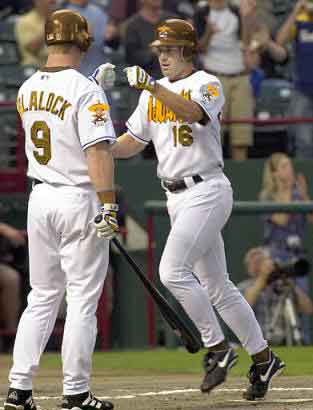 They ranked second in the DMBL in home runs (232), third in OPS (.805), OBP
(.347), SLG (.458), runs created (905.4) and total average (.765), and fifth
in team batting average (.278). The key to the offense is lead-off hitter
and Kevin Mitchell Award candidate
Edgar Renteria, who led the league
in hits (230) and runs (124); was second in stolen base percentage (.815);
tied for second in doubles (49); fourth in stolen bases (22); tied for fourth
in intentional walks (13); fifth in batting average (.322); sixth in runs
created (131.6); and seventh in OBP (.399). He also had a 31-game hitting
streak, the second-longest (by one game!) in league history. The Banditos
have three other All-Stars in the lineup: Hank Blalock
(.322, .890 OPS, 27 HR, 88 RBI), Bret Boone (.277, .829 OPS, 29 HR, 110 RBI) and Ramon Hernandez (.323, .855 OPS, 18 HR, 77 R). But
their most productive hitters in their first-round sweep of the Mudcats were
Preston Wilson (.455, 1.364 OPS,
2 2B, 1 HR, 2 RBI), Bret Boone (.385, .429 OBP, 1
SB) and some guy named Vladimir Guerrero (.333, 2
R).
They ranked second in the DMBL in home runs (232), third in OPS (.805), OBP
(.347), SLG (.458), runs created (905.4) and total average (.765), and fifth
in team batting average (.278). The key to the offense is lead-off hitter
and Kevin Mitchell Award candidate
Edgar Renteria, who led the league
in hits (230) and runs (124); was second in stolen base percentage (.815);
tied for second in doubles (49); fourth in stolen bases (22); tied for fourth
in intentional walks (13); fifth in batting average (.322); sixth in runs
created (131.6); and seventh in OBP (.399). He also had a 31-game hitting
streak, the second-longest (by one game!) in league history. The Banditos
have three other All-Stars in the lineup: Hank Blalock
(.322, .890 OPS, 27 HR, 88 RBI), Bret Boone (.277, .829 OPS, 29 HR, 110 RBI) and Ramon Hernandez (.323, .855 OPS, 18 HR, 77 R). But
their most productive hitters in their first-round sweep of the Mudcats were
Preston Wilson (.455, 1.364 OPS,
2 2B, 1 HR, 2 RBI), Bret Boone (.385, .429 OBP, 1
SB) and some guy named Vladimir Guerrero (.333, 2
R).
The Banditos' ace, Javier Vazquez (15-6, 3.42 ERA,
11.1 R/9), won his only start in the first round, giving up 3 ER, 7 H and
2 BB with 7 K in 8.0 IP. But the team's best effort came courtesy of third
starter Josh Beckett (8-10, 5.59 ERA, 15.6 R/9),
who pitched 7 shutout innings in Game 3 (8 H, 1 BB, 6 K, 3 GIDP). The first
pick in this year's draft, 21-year-old rookie Dontrelle
Willis (4-16, 6.05 ERA, 16.0 R/9), picked up the win despite giving up
10 hits, 2 walks and 4 earned runs in 7.2 IP. If manager Dennis Martinez needs a Game 4 starter, he could go
with Ryan Franklin (8-13, 5.15 ERA, 14.8 R/9), Hideo Nomo (5-10, 6.04 ERA, 15.5 R/9) or Tim Redding (4-5, 5.59 ERA, 15.6 R/9) -- but after
looking at those numbers, he might be better off sticking with a three-man
rotation... Closer Eric Gagne (12-1, 22 SV, 1.47 ERA,
7.5 R/9, 148 K in 97.2 IP) had an incredible post-season (2 SV, 0 R, 1 H,
0 BB, 7 K in 4.1 IP). He's set up by lefty Dan Plesac
(2-3, 3 SV, 2.37 ERA, 11.1 R/9) and righties Guillermo
Mota (9-6, 4 SV, 2.71 ERA, 11.2 R/9), Jose Valverde
(7-6, 4.65 ERA, 12.0 R/9) and Danys Baez (3-4, 7.38 ERA, 17.8 R/9).
The bottom line:
Sooner or later, the clock has to strike midnight on this Cinderella story.
Pedro and Schilling are more than enough to counter Vazquez and Beckett,
and rookie southpaw Willis is likely to be devoured by the numerous lefty
mashers in Arkansas's platoon-loving lineup. Tijuana has proven the pundits
wrong time and time again this season, but the Golden Falcons are too experienced
to fall for the fairy-tale hype. But Arkansas can't start printing the World
Series tickets just yet; even if they're out of pixie dust, the Banditos
still have Vazquez, Renteria, Guerrero and Gagne.
Newark Sugar Bears
(#2, 99-63) vs. Honolulu Sharks (#5, 83-79)

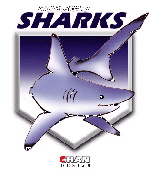 How happy are the Newark Sugar Bears that their cross-state
rivals, the Stanhope Mighty Men, were knocked out
in the first round? The Mites were the only team in the DMBL to post a winning
record against the Sugar Bears this season, had nearly caught them several
times for the Hanover Division title, and had loaded up for the playoffs
by adding several huge names in trades down the stretch. But the expected
show-down never happened, as the Honolulu Sharks
shocked Stanhope in a thrilling five-game series, eliminating what would
appear to be Newark's biggest obstacle toward reaching a record-tying fourth
straight World Series. Newark owner Butch Garretson
owes Honolulu owner Adam Kozubal a thank-you card,
but he intends to send it in the form of a quick exit from the playoffs as
the two teams face each other in the post season for the first time.
How happy are the Newark Sugar Bears that their cross-state
rivals, the Stanhope Mighty Men, were knocked out
in the first round? The Mites were the only team in the DMBL to post a winning
record against the Sugar Bears this season, had nearly caught them several
times for the Hanover Division title, and had loaded up for the playoffs
by adding several huge names in trades down the stretch. But the expected
show-down never happened, as the Honolulu Sharks
shocked Stanhope in a thrilling five-game series, eliminating what would
appear to be Newark's biggest obstacle toward reaching a record-tying fourth
straight World Series. Newark owner Butch Garretson
owes Honolulu owner Adam Kozubal a thank-you card,
but he intends to send it in the form of a quick exit from the playoffs as
the two teams face each other in the post season for the first time.
Newark has reached the post-season in every
season of its nine-year existence, winning three DMBL titles. In their five
playoff series losses, one came in the first round, three in the second round
and one in the World Series. So it would appear that the second round has
been the toughest hurdle for the Sugar Bears. Meanwhile, the Sharks have
been relentlessly buliding toward greatness, taking one more step each season:
In 2002, they missed the playoffs by one game; in 2003, they reached the
post-season but were knocked out in the first round; and this year, they
survived the first round to come within four wins of their first-ever World
Series appearance. But they'll have to overcome a Newark team that went 7-6
against them in the regular season, and had the league's best home record
at 55-26 -- with four of the seven games to be played at The Cereal Bowl.
Conventional wisdom holds that pitching
and defense wins championships. If that's true, the Sugar Bears
are in trouble. They ranked 7th with 786 runs allowed, a combination of a
mediocre pitching (6th in ERA at 4.28, 8th in K/9 at 6.3, tied for 8th in
H/9 at 9.8) and sloppy fielding (they ranked last in fielding percentage
at .976 and first in most errors with 149). The Sharks ranked comfortably
ahead of them in both areas, ranking third with 736 runs allowed -- thanks
to excellent pitching (first with 12.0 R/9 and 8.3 H/9; second with .537
QS%; tied for third with .093 CG%) and excellent defense (fourth in fewest
errors at 95, and tied for fourth with a .984 fielding percentage).
But that pitching-and-defense stuff is
your father's baseball logic. The "new baseball," as espoused by Moneyball, puts the premium on on-base percentage -- and
here the Sugar Bears have no peers. The team ranked first with a .372 OBP
-- that's right, a team OBP of .372
-- and led the league with 774 walks, over 100 more than the next team. All
those walks create plenty of scoring chances, and the Sugar Bears took advantage,
ranking first in runs scored (1008), batting average (.285), slugging percentage
(.470), OPS (.842), doubles (387), runs created (1026.1), total average (.838)
and total bases (2691). All that offense was more than enough to compensate
for their mediocre pitching staff; in fact, their +222 run-differential led
the league, and the Pythagorean
Theorem holds that Newark, not Arkansas, is the league's best team. The
Sharks, by contrast, scored just 711 runs -- second-fewest in baseball --
for an eighth-place -25 run-differential.
So, this second round match-up can be seen
as a referendum on old school vs. new school, "pitching and defense" vs.
"take and rake." Scouts and sabermetricians, take note! The winner will either
be proof that you're right, or a chance to bemoan the unpredictability of
the short series format.
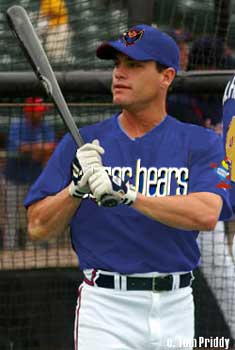 There's nothing unpredictable about the Sugar Bears offense. This lineup
was the first in three years to break the 1,000-run plateau, but it also
was the fifth straight year that the Sugar Bears have led the league in scoring.
And it's not just about one or two guys. In fact, each of the league's other
top five offenses -- Stanhope, Philadelphia, Tijuana and Arkansas -- has
a hitter who ranks ahead of any Newark batter in runs created (Gary Sheffield, Albert Pujols,
Edgar Renteria and Barry Bonds, respectively). As you can imagine, that's
not a point that will make opposing pitchers breathe easier. It just means
the Sugar Bears have a bunch of guys who can kill you! The most dangerous
member of this murderer's row might be its newest addition -- rookie Marcus Giles, who hit .319 (.376 OBP, .540 SLG). Despite
playing in just 149 games, Giles led the team in hits (198), doubles (49),
runs (110) and runs created (127.0), and tied for the team lead in stolen
bases (12) and stolen base percentage (.857). That kind of production coming
from one of the league's top defensive second basemen (fourth in fielding
percentage, fifth in total chances) makes him a candidate for both the Kevin Mitchell and Pat Listach awards. Other new faces in
this lineup are Bill Mueller (.300, .885 OPS, 44
2B, 121 RBI), Hideki Matsui (.299, .804 OPS, 35 2B,
67 RBI in 358 AB) and Greg Myers (.310, 1.019 OPS
in 116 AB with Newark; .282, .823 OPS, 20 HR, 76 RBI overall). But this offense
is still built around the core of Manny Ramirez (.295,
28 HR, 112 RBI), Bobby Abreu (.280, .389 OBP, 23
2B, 89 R), Chipper Jones (.266, 20 HR, 70 RBI) and
Jim Thome (.257, 34 HR, 96 RBI).
Newark manager Don Mattingly can call on one of the
deepest benches in baseball, with Paul Lo Duca (.352,
.888 OPS in 100 PA), Mark McLemore (.332, .842 OBP
in 305 PA) and Jeff DaVanon (.318, .889 OPS in 301
PA).
There's nothing unpredictable about the Sugar Bears offense. This lineup
was the first in three years to break the 1,000-run plateau, but it also
was the fifth straight year that the Sugar Bears have led the league in scoring.
And it's not just about one or two guys. In fact, each of the league's other
top five offenses -- Stanhope, Philadelphia, Tijuana and Arkansas -- has
a hitter who ranks ahead of any Newark batter in runs created (Gary Sheffield, Albert Pujols,
Edgar Renteria and Barry Bonds, respectively). As you can imagine, that's
not a point that will make opposing pitchers breathe easier. It just means
the Sugar Bears have a bunch of guys who can kill you! The most dangerous
member of this murderer's row might be its newest addition -- rookie Marcus Giles, who hit .319 (.376 OBP, .540 SLG). Despite
playing in just 149 games, Giles led the team in hits (198), doubles (49),
runs (110) and runs created (127.0), and tied for the team lead in stolen
bases (12) and stolen base percentage (.857). That kind of production coming
from one of the league's top defensive second basemen (fourth in fielding
percentage, fifth in total chances) makes him a candidate for both the Kevin Mitchell and Pat Listach awards. Other new faces in
this lineup are Bill Mueller (.300, .885 OPS, 44
2B, 121 RBI), Hideki Matsui (.299, .804 OPS, 35 2B,
67 RBI in 358 AB) and Greg Myers (.310, 1.019 OPS
in 116 AB with Newark; .282, .823 OPS, 20 HR, 76 RBI overall). But this offense
is still built around the core of Manny Ramirez (.295,
28 HR, 112 RBI), Bobby Abreu (.280, .389 OBP, 23
2B, 89 R), Chipper Jones (.266, 20 HR, 70 RBI) and
Jim Thome (.257, 34 HR, 96 RBI).
Newark manager Don Mattingly can call on one of the
deepest benches in baseball, with Paul Lo Duca (.352,
.888 OPS in 100 PA), Mark McLemore (.332, .842 OBP
in 305 PA) and Jeff DaVanon (.318, .889 OPS in 301
PA).
As has been the case throughout their existence,
the Sugar Bears' starting rotation consists of a bunch of has-beens and who-dats
who can pitch long enough for the offense to put a 10-spot on the scoreboard,
then hand it off to a very deep and talented bullpen. Pitching coach Mike Grace will likely cover his eyes and pick a starter
at random from the collection of Eric DuBose (15-5,
4.05 ERA, 12.5 R/9), Carl Pavano (14-7, 4.92 ERA,
13.6 R/9), Scot Shields (12-9, 5.05 ERA, 13.4 R/9),
John Thomson (16-10, 4.27 ERA,
12.7 R/9) or Jerome Williams (2-2, 3.96 ERA, 13.1
R/9 in 7 starts with Newark; 14-11, 5.16 ERA, 14.0 R/9 overall). Forget about
veteran lefties Randy Johnson and
Andy Pettitte, who pitched so poorly over the
first half (Johnson went 0-2 with 25.07 ERA, Pettitte 4-4 with a 5.69) that
they've long since been banished to extended rehab assignments. But while
it may be uncertain who starts the game, it's obvious who will finish it:
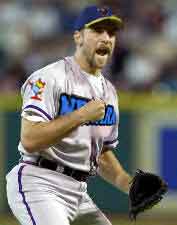 John Smoltz, who won his second
straight Dennis Eckersley Reliever of the
Year Award by leading the league with 73 relief points (34 saves,
8 wins, 6 losses, 5 blown saves). Smoltz posted a 2.21 ERA, 9.7 R/9 and struck
out 87, against just 12 walks, in 85.1 IP. Setting him up is one of the deepest
bullpens in baseball, with lefties Felix Heredia
(1.53 ERA, 7.1 R/9) and Mike Stanton (3.48 ERA, 11.8
R/9) and righties Keith Foulke (3.20 ERA, 9.9 R/9),
Tim Spooneybarger (3.23 ERA, 11.8
R/9) and Jack Cressend (3.50 ERA, 10.4 R/9). The
Sugar Bears' bullpen ranked first in holds (51), third in lowest percentage
of inherited runners scored (.242), third in winning percentage when ahead
or tied after seven innings (.861), and fourth in lowest BS% (.268).
John Smoltz, who won his second
straight Dennis Eckersley Reliever of the
Year Award by leading the league with 73 relief points (34 saves,
8 wins, 6 losses, 5 blown saves). Smoltz posted a 2.21 ERA, 9.7 R/9 and struck
out 87, against just 12 walks, in 85.1 IP. Setting him up is one of the deepest
bullpens in baseball, with lefties Felix Heredia
(1.53 ERA, 7.1 R/9) and Mike Stanton (3.48 ERA, 11.8
R/9) and righties Keith Foulke (3.20 ERA, 9.9 R/9),
Tim Spooneybarger (3.23 ERA, 11.8
R/9) and Jack Cressend (3.50 ERA, 10.4 R/9). The
Sugar Bears' bullpen ranked first in holds (51), third in lowest percentage
of inherited runners scored (.242), third in winning percentage when ahead
or tied after seven innings (.861), and fourth in lowest BS% (.268).
But don't concede the end-game to the Sugar
Bears just yet. In fact, the Sharks' relievers led the league in save percentage
(.784), as befitting a pitching staff coached by former closer Randy Myers. They also had the league's second-best
record (65-3) when ahead after seven innings and the second-best record (26-18)
in one-run games. Veteran closer Ugueth Urbina (5-6,
28 SV, 3.58 ERA, 10.0 R/9) is solid, but the real strength in the bullpen
is the one-two punch of lefty Kelly Wunsch (3-3,
4 SV, 13 holds, 2.72 ERA, 11.9 R/9, .333 IR%) and righty Rafael Soriano (9-1, 4 SV, 13 holds, 2.51 ERA, 8.0
R/9, .233 IR%). The bullpen was particularly tough in the first round, combining
to allow just 2 out of 9 (.222) inherited runners to score.
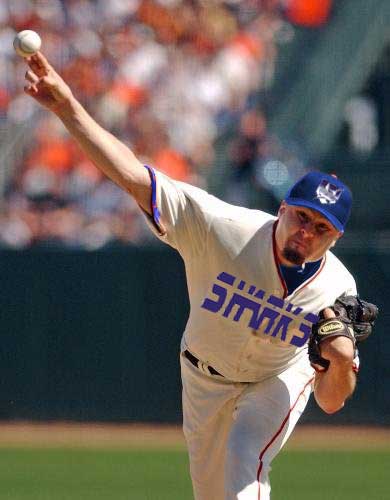 But the real story in Honolulu this year was the rotation, anchored by 30-year-old Jason Schmidt. The right-hander deserves consideration
for the Ben McDonald Award contender
despite 13-11 record, as he led the DMBL in fewest BR/9 (10.1), and finished
2nd in H/9 (7.5); 3rd in QS% (.742); 7th in ERA (3.54) and strikeouts (203);
8th in innings (224.0); tied for 8th in complete games (4); and tied for
9th in K/9 (8.2). Schmidt was awesome during the series against Stanhope
(2-0, 1.65 ERA, 8.8 R/9), but crafty manager Gary Carter
elected to save him for an easier match-up. With Schmidt and 25-year-old
Roy Oswalt (13-13, 4.02 ERA, 11.8
R/9) both on the bench, the opening game honors went to Russ Ortiz (11-15, 4.70 ERA, 12.2 R/9), but he was
bombed (4 ER, 6 H, 2 BB in 5.2 IP) and replaced in the rotation by lefty
Mark Mulder (11-12, 4.56 ERA, 13.0
R/9), who was even worse (4 ER, 8 H, 5 BB in 4.1 IP). The only other options
are southpaw Ted Lilly (8-12, 5.25 ERA, 13.4 R/9)
or spot starter Jason Johnson (2-4, 7.22 ERA, 17.9
R/9). The Sharks actually might want to consider going with one of the lefties,
since the Sugar Bears were actually worse against southpaw starters (.581
W%) than against righties (.630 W%).
But the real story in Honolulu this year was the rotation, anchored by 30-year-old Jason Schmidt. The right-hander deserves consideration
for the Ben McDonald Award contender
despite 13-11 record, as he led the DMBL in fewest BR/9 (10.1), and finished
2nd in H/9 (7.5); 3rd in QS% (.742); 7th in ERA (3.54) and strikeouts (203);
8th in innings (224.0); tied for 8th in complete games (4); and tied for
9th in K/9 (8.2). Schmidt was awesome during the series against Stanhope
(2-0, 1.65 ERA, 8.8 R/9), but crafty manager Gary Carter
elected to save him for an easier match-up. With Schmidt and 25-year-old
Roy Oswalt (13-13, 4.02 ERA, 11.8
R/9) both on the bench, the opening game honors went to Russ Ortiz (11-15, 4.70 ERA, 12.2 R/9), but he was
bombed (4 ER, 6 H, 2 BB in 5.2 IP) and replaced in the rotation by lefty
Mark Mulder (11-12, 4.56 ERA, 13.0
R/9), who was even worse (4 ER, 8 H, 5 BB in 4.1 IP). The only other options
are southpaw Ted Lilly (8-12, 5.25 ERA, 13.4 R/9)
or spot starter Jason Johnson (2-4, 7.22 ERA, 17.9
R/9). The Sharks actually might want to consider going with one of the lefties,
since the Sugar Bears were actually worse against southpaw starters (.581
W%) than against righties (.630 W%).
The Sharks don't want to get into a slugfest
with the Sugar Bears; Honolulu's offense ranked near the bottom in just about
every category: 11th in doubles (259); tied for 11th in home runs (164);
12th in OBP (.322); 13th in runs scored (711) and batting average (.247);
and dead last in OPS (.712), SLG (.390), total bases (2165) and runs created
(708.4). But the Sharks do some things right on offense: 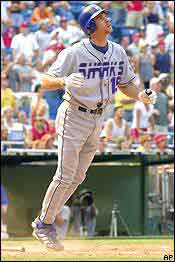 They finished 5th in most walks (536), 4th in fewest strikeouts (991) and
2nd in best stolen base percentage (.807). And they have an MVP-caliber slugger
at the heart of the lineup in Jason Giambi, who led
the DMBL in home runs (50), walks (140) and secondary average (.618), and
led the team in OBP (.429), SLG (.608), OPS (1.038), runs (112), runs created
(147.4), total average (1.213), extra base hits (76), total bases (312),
and, naturally, intentional walks (15) -- despite hitting just .263, and
striking out 134 times. In the first round, Giambi hit .278 (.500 SLG) with
1 2B, 1 HR, but actually the biggest bats in the lineup were Miguel Tejada (.389, .450 OBP, 1 2B, 2 RBI) and Shawn Green (..333, 1.206 OPS, 2 HR, 6 RBI), making
this offense a lot more dangerous.
They finished 5th in most walks (536), 4th in fewest strikeouts (991) and
2nd in best stolen base percentage (.807). And they have an MVP-caliber slugger
at the heart of the lineup in Jason Giambi, who led
the DMBL in home runs (50), walks (140) and secondary average (.618), and
led the team in OBP (.429), SLG (.608), OPS (1.038), runs (112), runs created
(147.4), total average (1.213), extra base hits (76), total bases (312),
and, naturally, intentional walks (15) -- despite hitting just .263, and
striking out 134 times. In the first round, Giambi hit .278 (.500 SLG) with
1 2B, 1 HR, but actually the biggest bats in the lineup were Miguel Tejada (.389, .450 OBP, 1 2B, 2 RBI) and Shawn Green (..333, 1.206 OPS, 2 HR, 6 RBI), making
this offense a lot more dangerous.
The bottom line:
The Sharks had no chance to beat the Mighty Men, who had gone 9-4 against
them during the regular season; yet Honolulu won the series, 3 games to 2.
It would actually be somewhat less of an upset if the Sharks beat the Sugar
Bears, as Newark's regular season record against them was 7-6. Still, these
are the three-time defending division champions, and they would love a chance
to avenge last year's DMBL Championship loss against the Golden Falcons.
The Sharks have proven to be a tenacious opponet this post-season, but they're
going to have to be both lucky and good to extend their dream season into
the World Series.
|